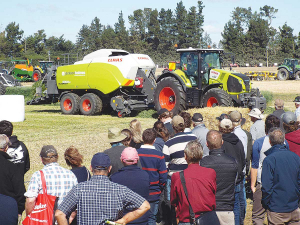Foliar feeding 'lifts N efficiency'
Research findings published in Europe support the concept of foliar fertilisation or foliar feeding in improving nitrogen use efficiency (NUE) while maintaining pasture productivity.
 A highlight for the 32,000 visitors at this year’s SIAFD were the working demonstrations held on each day of the event.
A highlight for the 32,000 visitors at this year’s SIAFD were the working demonstrations held on each day of the event.
After celebrating its 70th year last month, it looks like the South Island Agricultural Field Days (SIAFD) has hit its heights - with most exhibitors spoken to considering it to now be the 'best' field day of any sort in the country.
Exhibitors spoke of the ease of getting things done at SIAFD, with the event organisers taking a 'what can we do to help' attitude and nothing being too much trouble.
Blessed with good weather, this year's three-day event saw over 600 exhibitors, the majority with direct links to the rural sector, focusing on engagement with farmers or rural dwellers - rather than focusing on numbers through the gate.
Getting to the event, located at its permanent home at Kirwee, west of Christchurch, was made easy with a good traffic plan and easy parking. Entry was swift using a recently launched online ticketing system, leading to 32,000-plus visitors passing throuhg the turnstiles over the three days.
During the show, a highlight for many farmers or contractors, were the working demonstrations. These covered around 11ha and are said to be the largest display of working machinery of any field day in the country. Visitors were able to see the latest tractors and implements tackling stubble cultivation, mowing, raking, baling - in round or square formats - wrapping and harvesting.
"This part of the event just keeps getting better and better," Class Harvest Centre's Roger Nehoff told Rural News.
"It is organised by a committee of farmers and nothing is too much trouble.
"Even to the point of being asked way before the event what crops we wanted planted and in what direction. It certainly gives us a great shop window to display our products, making SIAFD a standout for us in the annual round of field days."
Exhibitors also reported that visitors were in a buoyant mood, with deals being done and on-farm demos being organised.
The only 'fly in the ointment' appeared to be a longer lead time for overseas products to arrive, due to severely disrupted worldwide shipping, and reduced production caused by disrupted component supply and social distancing rules.
The message to buyers from most exhibitors is: "If you need spring delivery, get your orders in now!"
It is expected that things are likely to get worse before they get better, with Europe in particular seemingly entering a third wave of Covid-19 infections.
Expect greater collaboration between Massey University’s school of Agriculture and Environment and Ireland’s leading agriculture university, the University College of Dublin (UCD), in the future.
A partnership between Torere Macadamias Ltd and the Riddet Institute aims to unlock value from macadamia nuts while growing the next generation of Māori agribusiness researchers.
A new partnership between Dairy Women’s Network (DWN) and NZAgbiz aims to make evidence-based calf rearing practices accessible to all farm teams.
Despite some trying circumstances recently, the cherry season looks set to emerge on top of things.
Changed logos on shirts otherwise it will be business as usual when Fonterra’s consumer and related businesses are expected to change hands next month.
Reflecting on the past year, Horticulture New Zealand chief executive Kate Scott says there has been a lot to celebrate.